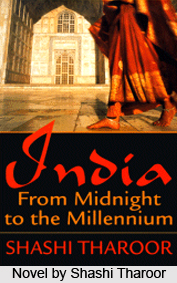 Shashi Tharoor, though born and brought up in distant England, he never got diverted from the Indian Literary tradition. The novels of Shashi Tharoor are enthused with his nostalgia for India. Both in fictional and non-fictional narratives, Tharoor fetch materials from the great Indian epic and characters from the Indian struggle for Independence to depict a satirical story of Indian life in a non-linear mode. At the same time a diplomat anda writer, Shashi Tharoor has explored the diversity of culture in India. Both his fictions and non-fictions unfold the themes of India`s past and its relevance to India`s future. Essentially satirical comedy, the novels of Shashi Tharoor are poignantly didactic works camouflaged as entertainment.
Shashi Tharoor, though born and brought up in distant England, he never got diverted from the Indian Literary tradition. The novels of Shashi Tharoor are enthused with his nostalgia for India. Both in fictional and non-fictional narratives, Tharoor fetch materials from the great Indian epic and characters from the Indian struggle for Independence to depict a satirical story of Indian life in a non-linear mode. At the same time a diplomat anda writer, Shashi Tharoor has explored the diversity of culture in India. Both his fictions and non-fictions unfold the themes of India`s past and its relevance to India`s future. Essentially satirical comedy, the novels of Shashi Tharoor are poignantly didactic works camouflaged as entertainment.
The Great Indian Novel : - The Great Indian Novel intermixing ideally ambition, daring emotion, and bold satire, enlaced with the different character of Mahabharata, is the perfect insignia of Tharoor`s mastery.
Reasons of State : - Reasons of State is mainly concerned with the political developments of India owing to the Indian foreign policy during the era of Indira Gandhi.
Show Business: - Show Business explores Bombay as the movie industry. The contemporary myth invented by the popular Hindi cinemas happens to be the key theme of the novel.
India from Midnight to Millennium: - commemorating the 50th years of India`s independence the novel depict an analytical study of both of India`s past and future.













